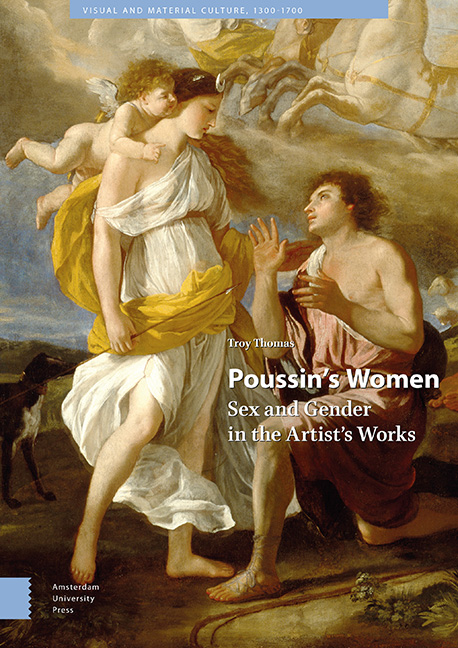Book contents
- Frontmatter
- Contents
- List of Illustrations
- Acknowledgments
- Part I – Violence and Virtue in Poussin’s Representations of Women
- Part II – Poussin’s Women—Cultural and Social Frames
- Part III – Paintings and Drawings
- 1 Predators
- 2 The Lustful—Triumphant, Impulsive, Spying, Conquered
- 3 Lovers—Genuine, Controlling, Unrequited, Jealous
- 4 Killers, Transgressors
- 5 Victims I—Killed, Assaulted
- 6 Victims II—Voiceless, Deceived
- 7 Heroines, Great Ladies
- Conclusion
- Bibliography
- Index
3 - Lovers—Genuine, Controlling, Unrequited, Jealous
Published online by Cambridge University Press: 20 November 2020
- Frontmatter
- Contents
- List of Illustrations
- Acknowledgments
- Part I – Violence and Virtue in Poussin’s Representations of Women
- Part II – Poussin’s Women—Cultural and Social Frames
- Part III – Paintings and Drawings
- 1 Predators
- 2 The Lustful—Triumphant, Impulsive, Spying, Conquered
- 3 Lovers—Genuine, Controlling, Unrequited, Jealous
- 4 Killers, Transgressors
- 5 Victims I—Killed, Assaulted
- 6 Victims II—Voiceless, Deceived
- 7 Heroines, Great Ladies
- Conclusion
- Bibliography
- Index
Summary
Abstract
Poussin's paintings present a wide range of approaches to love. Deeply felt love is portrayed in his Venus and Adonis (two versions), Acis and Galatea, Triumph of Neptune and Amphitrite, Arcadian Shepherds (first version), Spring (Earthly Paradise), and Summer. Mars and Venus depicts controlling love. Unfulfilled love is shown in his Tancred and Erminia (two versions) and Venus with the Dead Adonis, while Landscape with Juno and Argus represents jealous love.
Keywords: Lovers, Genuineness, Control, Unrequitedness, Jealousy
Poussin presents a wide range of approaches to love in his paintings, from deeply felt to controlling, from unfulfilled to jealous. Genuine, reciprocal love is the theme of several works, including two versions of Venus and Adonis, Acis and Galatea, Triumph of Neptune and Amphitrite, and even his first version of the Arcadian Shepherds, in which a partly clothed shepherdess suggests previous erotic activity. In addition, the first two canvases of his Four Seasons series include positive lovers: Spring (Earthly Paradise) portrays Adam and Eve before the fall, and Summer depicts Ruth and Boaz, who will become wife and husband. In Mars and Venus, Venus is shown as controlling in love, since she coerces Mars to dally in her bed of pleasure, thus thwarting his ambition to pursue his bellicose ways. Unrequited love is represented in Tancred and Erminia (two versions), where Erminia is unable to fulfill her love for Tancred. Finally, Poussin's Landscape with Juno and Argus displays jealousy in love. The jealous Juno places on the plumage of her peacock the hundred eyes of Argus, whom she had sent to guard Jove's latest paramour, Io; the all-seeing monster had been killed by Mercury at Jove's behest.
The Venus and Adonis in the Kimbell Art Museum, Fort Worth (c. 1624-1625, Fig. 3.1) expresses the deep, mutual love of the couple as Venus lies peacefully in her lover's lap, gently holding him as she looks into his eyes. Symbolic hints of Adonis's future early death, such as the torch on the ground, the sleeping cupid, and the black clouds, are kept to a minimum.
- Type
- Chapter
- Information
- Poussin's WomenSex and Gender in the Artist's Works, pp. 171 - 204Publisher: Amsterdam University PressPrint publication year: 2020



